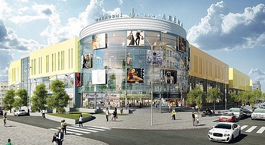
Four Plzeň residents challenged the referendum that rejected the massive construction project
 |
The citizens who filed the lawsuit are also requesting the court to issue a preliminary injunction that would impose on Plzeň the obligation to "refrain from all legal and other actions required by the referendum." Martin Marek, the representative of the preparatory committee, believes that the petitioners will not succeed.
The petitioners are questioning the question posed in the referendum and also argue that the investor would suffer "serious harm." Plzeň residents responded to the question of whether they agree that the city of Plzeň should take all immediate steps to prevent the construction of a commercial facility on the site of the demolished Inwest Cultural House. According to the suing group, the question is inadmissible because it contains very vague terms such as "all steps."
Plzeň city councilors will decide on Thursday about further steps mandated by the results of the referendum. After that, the city will immediately start negotiations with Amádeus about changes to its plans or the sale of its three-hectare plot to the city. It will be necessary to terminate leases on city lands that the project relied on, said Deputy Mayor Martin Zrzavecký (ČSSD). Although these are only small areas, if the investor does not have them available, he would have to change the project and initiate new zoning proceedings.
Amádeus has already stated several times that it does not want to sell its land to the city. If he were to ever agree to do so, it would not be for hundreds of millions of crowns, as the city estimates, but including the expenses incurred so far and the thwarted investment, he would demand units of billions from Plzeň. "I fear that the investor will demand compensation for the thwarted investment. The city has long-term financial obligations to the European Investment Bank. It is a question of how Plzeň's position will be assessed," Zrzavecký said. The contract with the EIB also accounts for the inability to repay loans, which could, in the worst-case scenario, mean ending cooperation with the EIB and immediate repayment of all obligations.
"We can only wait to see what the city will do, and we will act accordingly," Petřík said. The investor is not currently considering redesigning the project into a smaller facility that would not require peripheral city lands. The zoning procedure that the investor suspended at the city's request until the results of the referendum is now, according to him, automatically continuing.
According to Zrzavecký, the previous leadership of Plzeň made a mistake. "They did not allow public discussion and did not want to heed criticism. Two years ago, we were in a difficult situation. We either try to complete the ongoing project with as few damages as possible, or we will have to pay," he stated.
The multifunctional building is set to rise by 2015 on the site of last year's demolished cultural house. It will have 90 establishments and employ nearly 1,000 people. Opponents, who collected nearly 20,000 signatures for the referendum, argue that the complex will cause bankruptcies of small merchants in the center, traffic congestion, more noise and dust, and disagree with its size of 35,000 m².
The English translation is powered by AI tool. Switch to Czech to view the original text source.
0 comments
add comment
Related articles
0
23.01.2014 | Due to the city's approach, Amádeus terminated the giant house project in Plzeň
0
22.03.2013 | The proceedings regarding the giant house in Plzeň, rejected by referendum, are suspended
0
21.03.2013 | Plzeň wants another legal analysis on how to resist the construction of a giant building
0
07.03.2013 | Plzeň today rejected the construction of a giant shopping center
0
19.02.2013 | Plzeň urged the investor of the controversial building to sell her the land
0
29.01.2013 | Plzeň sent the investor of the giant building a list of steps after the referendum
1
15.01.2013 | Plzeň will begin negotiations with the investor of the giant building about changes to his plans
1
12.01.2013 | Plzeň residents rejected the giant shopping center in the referendum
0
05.12.2012 | Město Plzeň i aktivisté zahájili kampaň k referendu o obřím domě
The city of Plzeň and activists have launched a campaign for a referendum on the giant house
0
23.11.2012 | Investor suspends proceedings on the giant house in Plzeň until the results of the referendum
1
05.11.2012 | The referendum on the construction of a giant building in the center of Plzeň will be in January 2013
0
07.10.2012 | Activists will file a lawsuit against Plzeň due to the unannounced referendum
0
28.08.2012 | In Plzeň, the supplementary collection of signatures for the referendum ends today
0
26.08.2012 | Magistrate: The proposal for a referendum on the house in Plzeň is missing 16% of signatures
0
22.08.2012 | Plzeň: The proposal for a referendum on the construction of a giant building has three flaws
0
21.08.2012 | Plzeň will announce on Wednesday whether there will be a referendum on the giant building in the center
0
23.07.2012 | The association against the giant house in Plzeň has enough signatures for a referendum
0
16.05.2012 | Plzeň Cultural House Inwest was demolished
0
07.12.2011 | Massive multifunctional building in the center of Plzeň receives positive EIA assessment
0
09.08.2011 | Plzeň wants to have a say in the shape of the new building instead of the "culture house"









